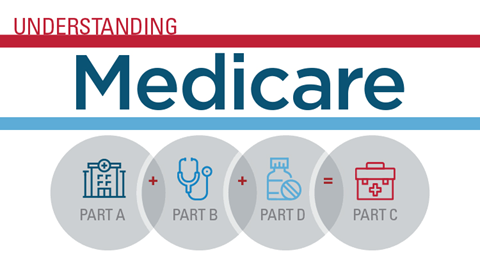A, B, C, D... Learn About Each Part of Medicare with Me!
June 14, 2023It is important to know if you qualify for this federal health insurance program and what specific services each part of Medicare covers.
Medicare is a government health insurance program. One can qualify for Medicare if they are age 65 or older. You may also be eligible for Medicare if you are younger than 65 but have a certain disability, are in End-Stage Renal Disease (ERSD) or have ALS (Lou Gehrig's disease).
It is important to know the different ways you can qualify for Medicare and what each part of Medicare covers because if you are eligible, it will help reduce the financial risk of illness and/or injury.
Parts of Medicare
Part A (Hospital Insurance)
- Part A of Medicare can help cover many inpatient costs that a patient might need. This includes hospital care, skilled nursing facility care, home health care, and hospice care.
- Part A is mandatory for all Medicare enrollees.
Part B (Medical Insurance)
- Part B of Medicare helps cover outpatient services, preventative care services, doctors’ visits, and medical supplies.
- Part B is optional for those who wish to enroll in an Original Medicare plan; however, if you enrolled in a Medicare Advantage plan, both Parts A and B are mandatory.
Part C (a.k.a. Medicare Advantage)
- Medicare Advantage is a “bundle” plan that includes Parts A and B of Medicare, and commonly Part D, which is prescription drug coverage. This type of plan is offered through a private, Medicare-approved, company.
- Medicare Advantage works similarly to a Managed Care Organization (MCO) in that in most cases you’ll have to use the physicians who are in the plan’s network. In many cases, a Medicare Advantage plan may have lower out-of-pocket costs and may include extra benefits such as vision, dental, and hearing coverage.
- Medicare Advantage is different from an Original Medicare plan; therefore, it is important to know the differences to ensure you find the right plan for you.
Part D (Medicare Drug Coverage)
- Part D helps cover the costs of prescription drugs you may need for your care. To add Medicare Drug Coverage to your plan, you must join a Medicare-approved plan that offers Part D.
- Medicare drug coverage is an optional part of Medicare.
Does My Provider Accept Medicare or Medicare Advantage?
While most providers do accept Medicare coverage, it is always important to check with your health care provider first to be safe.
Getting Started
If you believe you are eligible for Medicare, be sure to review the Medicare website to learn more about the Medicare basics, finding a plan that is best for you, costs, how to sign up, etc.
Learn more about the different Accepted Insurance Plans for St. Mary’s Health Care System.

